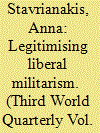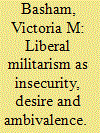| Srl | Item |
| 1 |
ID:
144268


|
|
|
|
|
| Summary/Abstract |
Post-cold war efforts to knit together human rights and international humanitarian law in pursuit of tougher arms transfer control reached their apogee in the UN Arms Trade Treaty (ATT). In contrast to dominant accounts based on human security norms, I argue that a key effect of the ATT is to legitimise liberal forms of militarism. During negotiations the US and UK governments justified their arms export practices in terms of morality, responsibility and legitimacy. More broadly their arms transfer practices are explained away by reference to national regulatory regimes that exceed the standards set out in the ATT. Arms transfers to Egypt and intra-Western transfers illustrate the way these justifications and regimes serve to shield US–UK weapons transfers and use from scrutiny and accountability. Rather than signalling the victory of human security, the ATT is better understood as facilitating the mobilisation of legitimacy for contemporary liberal forms of war fighting and war preparation.
|
|
|
|
|
|
|
|
|
|
|
|
|
|
|
|
| 2 |
ID:
157919


|
|
|
|
|
| Summary/Abstract |
The use and maintenance of military force as a means of achieving security makes the identity and continued existence of states as legitimate protectors of populations intelligible. In liberal democracies, however, where individual freedom is the condition of existence, citizens have to be motivated to cede some of that freedom in exchange for security. Accordingly, liberal militarism becomes possible only when military action and preparedness become meaningful responses to threats posed to the social body, not just the state, meaning that it relies on co-constitutive practices of the geopolitical and the everyday. Through a feminist discursive analysis of British airstrikes in Syria and attendant debates on Syrian refugees, I examine how liberal militarism is animated through these co-constitutive sites, with differential effects. Paying particular attention to gender and race, I argue that militarism is an outcome of social practices characterized as much by everyday desires and ambivalence as by fear and bellicosity. Moreover, I aim to show how the diffuse and often uneven effects produced by liberal militarism actually make many liberal subjects less secure. I suggest therefore that despite the claims of liberal states that military power provides security, for many militarism is insecurity.
|
|
|
|
|
|
|
|
|
|
|
|
|
|
|
|